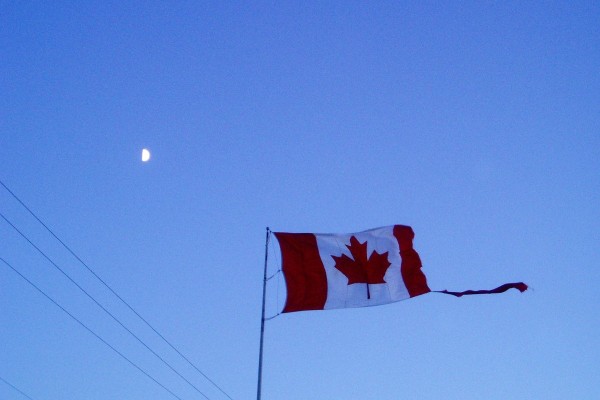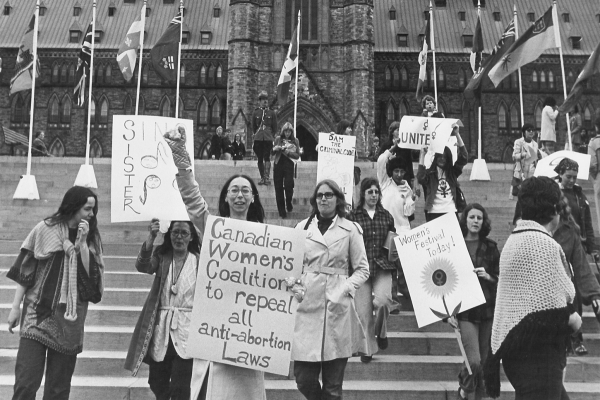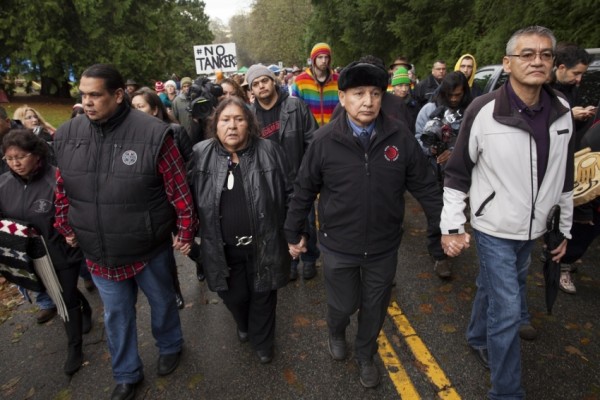Coronavirus colonialism: How the COVID-19 crisis is catalyzing dispossession

This image from a transmission electron microscope shows a sample from a case of COVID-19. The spherical viral particles, colored blue, contain cross-sections through the viral genome, seen as black dots. Image provided by the U.S. Centers for Disease Control and Prevention/Wikimedia Commons.
What a difference a month makes.
In February, many Canadians joined Shut Down Canada protests and blockades in solidarity with Wet’suwet’en hereditary chiefs. A month later, the streets in most Canadian cities are empty and Canadians are supporting a different kind of shut down to prevent the spread of the coronavirus, or COVID-19.
It’s been a whole new kind of March madness.
But while many Canadians are staying home and practicing social distancing to flatten the curve (itself an act of social solidarity with healthcare workers and vulnerable members of the population), now is not the time to turn inwards. We can’t afford to ignore the world outside of our own homes. Neither should practicing social distancing mean silencing our calls for social justice.
We must remain vigilant in these tumultuous times.
As Naomi Klein outlines in her bestselling book The Shock Doctrine, national emergencies often serve as catalysts for predatory economic practices known as “disaster capitalism.” In moments of profound shock and crisis, like natural disasters, wars, and global pandemics such as COVID-19, the rich and powerful can exploit the public’s disorientation and push forward ideas, policies, and practices that prioritize profit over people.
The same holds true for colonialism. Around the world, moments of crisis are also used to continue colonialism under cover of disaster, to borrow Klein’s phraseology.
Here in Canada, we are seeing many examples of how capitalist accumulation by colonial dispossession is continuing amidst the current pandemic.
Although Shut Down Canada actions have now ceased, the Wet’suwet’en struggle to assert their sovereignty and prevent Coastal GasLink’s construction of a pipeline through their unceded territory continues. In fact, while most Canadians have been preoccupied with news of the rapid spread of COVID-19, CGL, with support from the RCMP, has resumed its work in Wet’suwet’en territory, much to the dismay of Wet’suwet’en hereditary chiefs. Moreover, with the drop in oil and gas prices, KKR, an American private equity firm with a record of putting profits over employees, people, and the environment, has plans to purchase 65% of the Coastal GasLink pipeline with Alberta Investment Management Corp. It is clear that billionaire oil and gas CEOs see the COVID-19 crisis as an opportunity to push through their resource development plans that not only put Indigenous communities at risk of infection but also guarantee environmental degradation.
The coronavirus crisis is also testing Indigenous sovereignty. On March 18, citizens in the Nunavut community of Rankin Inlet blocked a road leading to the Agnico-Eagle Meliadine gold mine to help stop the spread of COVID-19. They wanted to prevent a planeload of itinerant workers from travelling to the mine for work. Dr. Michael Patterson, Nunavut’s Chief Medical Officer of Health, had asked non-essential people from outside the territory not to travel to Nunavut, and the residents of Rankin Inlet felt that the mine’s operation was not essential. Agnico-Eagle Meliadine disagreed and is bringing in workers from outside the territory to continue mining during the pandemic.
Similarly, the Haida Nation has asked tourists to stop visiting in an effort to protect citizens from the spread of COVID-19; however, many tourists are still flocking to Haida Gwaii for a holiday. The islands have two small hospitals with a limited number of beds and medical equipment, including just two ventilators. Though Pacific Coast Airlines, which flies from Vancouver to Masset, has now suspended flights to Haida Gwaii, BC Ferries is continuing its service from Prince Rupert to Skidegate and is transporting many outside tourists to the islands.
In Alberta, the United Conservative Party is using the coronavirus crisis and the drop in oil prices to backtrack on some of its promises. In late February, the UCP introduced a draconian budget, complete with plans to close 20 parks and recreational sites and turn over another 164 to private management. The government stressed, though, that it would not be selling off any Crown land and promised that it would instead enter into negotiations with municipalities and First Nations in the province to transfer land for local management. Just last week, however, the UCP announced that it had changed its mind and is now putting a 65-hectare grassland near Taber in the Treaty 7 region up for auction on March 31, with a starting bid of $440,000. This kind of disaster dispossession fits the mould of the “shock doctrine”—a right-wing government using a crisis to push through controversial ideas that prioritize private profit.
Though capitalists and colonial politicians often use emergencies to advance exploitative agendas, Klein argues that crises can also catalyze popular resistance. Catastrophes such as the current global pandemic bring our priorities into focus and can open up new opportunities to develop wider relations of compassion, reciprocity, and solidarity. Crises also make space for new ideas that we can use to radically transform society and put people before profit. Why bailout oil and gas companies who contribute to the climate crisis and ignore Indigenous rights when we can instead invest in health care, education, affordable housing, and renewable energy?
While we are all doing our best to adapt to the changing circumstances of the COVID-19 crisis, we must ensure that our isolation does not lead to collective complacency. Now is the time to double-down on our demands for justice and to distance ourselves from capitalism and colonialism.
Sean Carleton is a historian of Indigenous-settler relations and an Assistant Professor at Mount Royal University. He is also a member of the Canadian Dimension Coordinating Committee.










